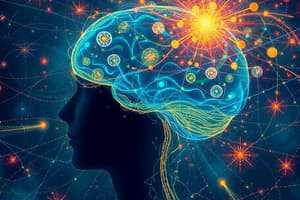Podcast
Questions and Answers
What is the primary focus of cognitive psychology?
What is the primary focus of cognitive psychology?
- Mental processes such as perception and memory. (correct)
- The study of observable behaviors only.
- The influence of biological factors on behavior.
- The historical development of psychology.
Which psychologist is known for establishing the first psychology laboratory?
Which psychologist is known for establishing the first psychology laboratory?
- John Watson
- Wilhelm Wundt (correct)
- William James
- B.F. Skinner
The cognitive revolution in psychology primarily signifies a shift from which approach?
The cognitive revolution in psychology primarily signifies a shift from which approach?
- Humanistic psychology
- Psychodynamic theory
- Cognitive-behavioral therapy
- Behaviorism (correct)
What is one characteristic of the information processing approach in cognitive psychology?
What is one characteristic of the information processing approach in cognitive psychology?
Which model represents specific parts of the brain and their connections in cognitive psychology?
Which model represents specific parts of the brain and their connections in cognitive psychology?
Who provided influential criticism of behaviorism, particularly regarding language learning?
Who provided influential criticism of behaviorism, particularly regarding language learning?
What does the information-processing model emphasize about the brain's functions?
What does the information-processing model emphasize about the brain's functions?
Which of the following is true about process models in cognitive psychology?
Which of the following is true about process models in cognitive psychology?
What does the Atkinson-Shiffrin model of memory consist of?
What does the Atkinson-Shiffrin model of memory consist of?
Which of the following is NOT a key research method in cognitive psychology?
Which of the following is NOT a key research method in cognitive psychology?
What approach focuses on observing and measuring behavior to draw conclusions about cognitive processes?
What approach focuses on observing and measuring behavior to draw conclusions about cognitive processes?
Which technique is used to correlate brain activity with mental processes?
Which technique is used to correlate brain activity with mental processes?
In what field can cognitive psychology be applied to enhance user experience?
In what field can cognitive psychology be applied to enhance user experience?
What does cognitive neuroscience combine?
What does cognitive neuroscience combine?
How do cognitive psychologists typically measure mental processes?
How do cognitive psychologists typically measure mental processes?
What is a major distinction between behaviorism and cognitive psychology?
What is a major distinction between behaviorism and cognitive psychology?
Flashcards
What is Cognitive Psychology?
What is Cognitive Psychology?
Cognitive psychology investigates how we acquire, process, store, and retrieve information. It focuses on mental processes like perception, attention, memory, language, problem-solving, decision-making, and reasoning.
Cognitive Revolution: What happened?
Cognitive Revolution: What happened?
The cognitive revolution marked a major shift in psychology, moving away from focusing solely on observable behavior (behaviorism) to studying internal mental processes.
What drove the Cognitive Revolution?
What drove the Cognitive Revolution?
Key factors included developments in computer science and artificial intelligence, which provided models to understand the mind as an information-processing system.
Information Processing: How does it work?
Information Processing: How does it work?
Signup and view all the flashcards
What are Structural Models?
What are Structural Models?
Signup and view all the flashcards
What are Process Models?
What are Process Models?
Signup and view all the flashcards
Why is studying Cognitive Psychology important?
Why is studying Cognitive Psychology important?
Signup and view all the flashcards
Cognitive Psychology vs. Behaviorism
Cognitive Psychology vs. Behaviorism
Signup and view all the flashcards
Cognitive Psychology
Cognitive Psychology
Signup and view all the flashcards
Scientific Method
Scientific Method
Signup and view all the flashcards
Behavioral Approach
Behavioral Approach
Signup and view all the flashcards
Physiological Approach
Physiological Approach
Signup and view all the flashcards
Applications of Cognitive Psychology
Applications of Cognitive Psychology
Signup and view all the flashcards
Cognition and the Brain
Cognition and the Brain
Signup and view all the flashcards
Measuring Cognitive Processes
Measuring Cognitive Processes
Signup and view all the flashcards
Artificial Intelligence (AI)
Artificial Intelligence (AI)
Signup and view all the flashcards
Study Notes
Cognitive Psychology: Introduction
- Cognitive psychology investigates mental processes like perception, memory, language, problem-solving, and decision-making, focusing on how individuals acquire, process, and retrieve information.
- Evolved from behaviorism, which concentrated solely on observable behaviors. The field emerged in the mid-20th century recognizing the mind's critical role.
- Key historical figures include Wilhelm Wundt who established the first psychology lab, and William James who explored attention and consciousness. Behaviorism, founded by John B. Watson, rejected introspection, focusing on observable behaviors.
- Influential figures in the cognitive revolution, like Noam Chomsky, critiqued behaviorism's explanation of language acquisition, while Herbert Simon and Allen Newell contributed to artificial intelligence.
- The cognitive revolution emphasized internal mental processes, driven by advances in computer science & AI, modeling the mind as an information-processing system.
Information Processing Approach
- Compares the mind to a computer by emphasizing sequential stages in information processing (input, processing, storage, output).
- Uses models to illustrate information flow, including:
- Structural models depicting brain structures and connections.
- Process models illustrating stages of cognition, such as the Atkinson-Shiffrin model of memory (sensory, short-term, long-term).
Methods and Applications
- Employs the scientific method to test mental processes through experiments, alongside case studies, naturalistic observation, and computer simulations.
- Studies cognition through both behavioral methods (e.g., reaction times) and physiological methods (e.g., fMRI, EEG).
- Has practical applications in various fields: education, human-computer interaction, and clinical psychology to understand cognitive dysfunctions.
Cognition and the Brain
- Cognitive neuroscience links cognitive psychology with neuroscience, studying brain activity related to cognition.
- Different brain areas are specialized for various cognitive functions.
Key Concepts and Terms
- Cognition encompasses all mental processes involved in acquiring knowledge, including perception, memory, language, and problem-solving.
- Behaviorism contrasts with cognitive psychology by focusing on observable rather than internal mental processes.
- Artificial intelligence (AI) contributes to understanding human cognition by mimicking human thinking tasks.
- Interconnection between brain structures and functions is essential to understand how human behavior correlates with the brain's activity.
- Cognition is measured indirectly using observable behaviors such as response times, accuracy, and self-reports within controlled experiments.
Studying That Suits You
Use AI to generate personalized quizzes and flashcards to suit your learning preferences.



